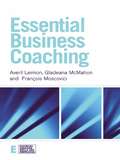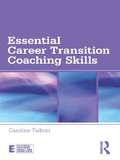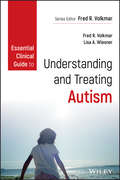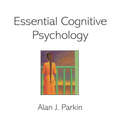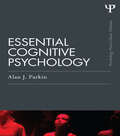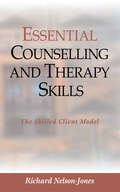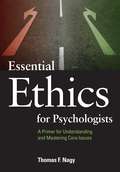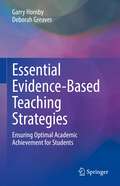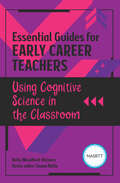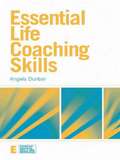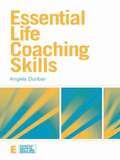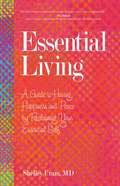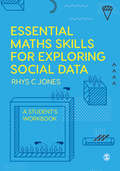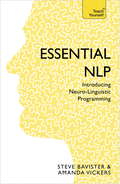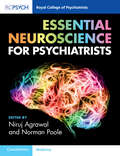- Table View
- List View
Essential Business Coaching: How To Run A Highly Successful Coaching Business (Essential Coaching Skills and Knowledge)
by Averil Leimon Gladeana McMahon Francois MoscoviciDo coaches need to be psychologists, business people or both? Essential Business Coaching offers a much-needed answer to the question of what makes a good business coach. The authors draw on 60 years of combined experience to provide an in-depth review of best practice and theory. They provide a thorough examination of the changing nature of work, the need for new sources of competitive advantage and the benefits of investing in coaching. Useful ideas for further reading are found throughout, along with numerous examples of real business coaching situations. The inclusion of interviews with both corporate sponsors and individual clients provide a unique insight into what makes good coaching in practice. The combination of solid theory and abundant examples make Essential Business Coaching an invaluable tool for all business coaches as well as counsellors, psychotherapists, human resource professionals and senior managers.
Essential Career Transition Coaching Skills (Essential Coaching Skills and Knowledge)
by Caroline TalbottCareer moves (even positive ones) can be disruptive for the individual, and the psychological impact of changing roles or careers is often underestimated. Career transition coaching is a relatively new field, but one that is highly relevant in the modern world. In Essential Career Transition Coaching Skills, Caroline Talbott explores the most effective career transition coaching techniques and explains the psychology behind them. Looking at both self-motivated and enforced career changes, the book pays particular attention to the psychological processes experienced by the client, so that the coach can understand and anticipate their reactions and help them make the most successful career moves. It covers general skills, tools and techniques that can be applied to any career transition as well as more specific examples such as moving from management into leadership, aspiring business owners and career changers. Case studies illustrating the methods of experienced coaches and step-by-step guides to coaching techniques are also included. Ideal for those already experienced in general coaching and looking to specialise, as well as anyone whose job requires coaching skills, such as managers and HR professionals, this timely book provides a comprehensive guide to the whole transition cycle – from choosing a career direction or change, to making a move and adapting successfully.
Essential Clinical Guide to Understanding and Treating Autism
by Fred R. Volkmar Lisa A. WiesnerOffers Primary-Care Providers Access to Expert, Current Research and Practice Guidelines Allowing Them to Confidently Support Children Who Present with Symptoms of Autism Coauthored by the premier expert on autism in the United States and an experienced academic and practicing pediatrician, this volume provides concise and practical information based on the most up-to-date research and clinical experience for primary caregivers around the world. In an environment full of contesting theories and advice, this book provides the gold standard of current research and practice for primary care providers Shows clinicians how to most effectively use evidence-based techniques Links to video lectures by Dr. Volkmar provided Topic covered include: Screening and Diagnosis Associated Medical Conditions Providing Medical Care Working with Families and Schools Behavioral Issues and Interventions Medications Changes with Age Did You Know? This book is available as a Wiley E-Text. The Wiley E-Text is a complete digital version of the text that makes time spent studying more efficient. Course materials can be accessed on a desktop, laptop, or mobile device—so that learning can take place anytime, anywhere. A more affordable alternative to traditional print, the Wiley E-Text creates a flexible user experience: Access on-the-go Highlight and take notes Search across content Save money! The Wiley E-Text can be purchased in the following ways: Check with your bookstore for available e-textbook options Directly from: www.wiley.com/x
Essential Cognitive Psychology (Psychology Press And Routledge Classic Editions Ser.)
by Alan J. ParkinThis new textbook provides a clear, fundamental grounding in cognitive psychology for beginning undergraduates. Essential Cognitive Psychology fills the void between low level introductory texts and more advanced books on the topic. This book provides the reader with highly accessible overviews of all core topics in the field. These are designed to be a strong basis for developing further interest in cognitive psychology but, at the same time, provide a self-contained account suitable for all students in psychology whose training requires degree-level competence in the subject. Beginning with a chapter on the origins of cognitive psychology, which facilitates an understanding of the topic as a whole, the book goes on to cover visual perception, attention, memory, knowledge, imagery, language, and reasoning and problem solving.Each chapter in Essential Cognitive Psychology also contains a list of key terms highlighted in the text and a series of revision questions which address key issues in the chapter. There are also suggestions for further reading.Written by an internationally recognised scientist and established book author, Essential Cognitive Psychology will be welcomed by teachers and students who require a thorough grounding in the topic without the specialization of more advanced textbooks.
Essential Cognitive Psychology: Classic Edition (Psychology Press & Routledge Classic Editions)
by Alan J. ParkinThis classic edition of Alan Parkin’s landmark textbook provides a clear, fundamental grounding in cognitive psychology for undergraduate students new to the subject. Essential Cognitive Psychology presents the reader with highly accessible overviews of all the core topics in the field. These introductions are designed to provide a strong basis for developing further interest in cognitive psychology, whilst at the same time forming self-contained accounts suitable for all students whose training requires a degree-level competence in Psychology. Beginning with a chapter on the origins of cognitive psychology, which facilitates an understand of the topic as a whole, the book then goes on to cover visual perception, attention, memory, knowledge, imagery, language, and reasoning and problem solving. Each chapter includes a number of helpful pedagogical features, including a list of key terms highlighted in the text and a series of revision questions which address key issues in the chapter. Written by an internationally recognised scientist and well-respected book author, and now with a brand new introduction from Jamie Ward, author of The Student’s Guide to Cognitive Neuroscience, Essential Cognitive Psychology will continue to be essential reading for students who require a thorough grounding in the topic without the specialization of more advanced textbooks.
Essential Counselling and Therapy Skills: The Skilled Client Model
by Richard Nelson-Jones`This is another well planned and well organized textbook specifically aimed at students in training as counsellors and psychotherapists, who have already completed an introductory course' - British Journal of Guidance and Counselling `Richard Nelson-Jones' focus on skilling the client provides a valuable toolkit, making explicit what is implicit in many counselling models. His "Skilled Client Model" provides an excellent substitute for Egan's "Skilled Helper" - Zoë Fitzgerald-Pool, Director of Training & Development, CSCT Limited `A text which provides trainers and trainees alike with a veritable treasure-house of creative ideas' - Brian Thorne, Emeritus Professor of Counselling, University of East Anglia and Co-Founder, Norwich Centre `The "skilled client model" is a distinct advance, I think... and very helpful' - Ron Perry, Director, Institute of Counselling, Sydney 'The book is written in a clear and orderly fashion.... Therapy is a process and learning is a process too, and this textbook will undoubtedly assist trainees to move along their own process of learning and becoming reflective and effective practitioners' - Stefania Gribcic, Counselling Psychology Review Essential Counselling and Therapy Skills is written for trainees who are beginning to work with clients under supervision. Building on what has been learnt during introductory courses, the book supports students in the next stage of their practical skills development. Written by leading author, Richard Nelson-Jones, Essential Counselling and Therapy Skills is a step-by-step guide to therapeutic work using the`skilled client model'. Central to this innovative approach, is the assumption that the skill of counsellors and therapists lies in their capacity to impart skills to clients. The book focuses on: establishing collaborative working relationships; working with clients to find shared definitions of their problems; enabling clients to improve how they think, communicate and act; and dealing with questions of diversity, ethical practice and the value of supervision. Accessibly written, the book contains numerous skill-building activities and case examples, making Essential Counselling and Therapy Skills an ideal textbook for practical skills training in counselling, counselling psychology, psychotherapy and other helping professions.
Essential Elements For Effectiveness: Optimal Functioning Through Positive Psychology
by Juan R. Abascal Patricia Stephenson Dominic Brucato Lauren BrucatoBeyond a psychology book, this is a guide for getting through life in one piece with a smile. No matter what you want to be or where you want to go, this is a must have.
Essential Ethics for Psychologists: A Primer for Understanding and Mastering Core Issues
by Thomas F. NagyThis introduction/review is intended for psychology students who have had minimal preparation in ethics or codes of professional conduct, and for psychologists who need a review. In addition to background, it presents ethical decision making models. The book begins by introducing the history and concepts of the APA Ethics Code, then treats four ethical concepts in depth: competence, informed consent, privacy and confidentiality, and avoiding harm and exploitation. These four concepts are then applied to specific roles such as psychological assessment, psychotherapy, research and publication, and ethics in teaching, training, and supervision. Case studies include fictional vignettes based on actual transgressions.
Essential Evidence-Based Psychopharmacology
by Stephen M. Stahl Dan J. Stein Bernard LererThis volume presents up-to-date, comprehensive and high quality reviews of the psychopharmacological evidence-base for each of the major psychiatric disorders, written by expert psychopharmacologists from around the world. Building on the success of the first edition, the volume summarizes the wealth of new developments in the field and sets them within the context of day-to-day clinical practice. All chapters have been fully updated and new contributions on personality disorders and substance dependence added. Each chapter provides information about optimal first line pharmacological interventions, maintenance pharmacotherapy and the management of treatment-refractory patients. The content is organized according to the DSM-V listing of psychiatric disorders, and covers all major conditions including schizophrenia, mood disorders, anxiety disorders, eating disorders and Alzheimer's disorder. These issues lie at the heart of clinical psychopharmacology, making this book invaluable to all practising and trainee clinicians, in a mental health setting or a less specialized environment.
Essential Evidence-Based Teaching Strategies: Ensuring Optimal Academic Achievement for Students
by Garry Hornby Deborah GreavesThis book examines evidence-based practices that facilitate effective teaching to ensure optimum educational achievement for school-age students. It identifies key strategies with extensive research evidence that confirms their effectiveness in improving student outcomes. The book offers guidelines for teachers to use in distinguishing between strategies that are evidence-based and those with little or no supporting evidence. It describes common instructional strategies often found in schools despite having little evidence to support their effectiveness. In addition, the book identifies eight key evidence-based teaching practices that can be directly implemented by classroom teachers, reviews the theoretical and research base of each of these strategies, and provides guidelines for special and general education teachers on how to apply them most effectively, with links to video examples of their use in classrooms. The text also examines common barriers to the use of evidence-based practices in schools. It explores implications for teacher education, focusing on training educators to identify and implement evidence-based strategies effectively, avoiding those lacking evidence, even if they are popular in schools. Essential Evidence-Based Teaching Strategies is a must-have resource for researchers, professionals, and graduate students in educational psychology, child and school psychology, and social work who are interested in learning about and implementing effective teaching methods that improve student engagement and academic achievement, strengthen social-emotional learning, and reduce school dropout rates.
Essential Evolutionary Psychology
by Simon J Hampton`It is refreshing, in the wake of the sometimes uncritical enthusiasm for evolutionary psychology, to read a thoughtful and balanced account of the problems as well as the benefits of an evolutionary perspective on human behaviour′ - Professor Anne Campbell, Durham University Essential Evolutionary Psychology introduces students to the core theories, approaches, and findings that are the necessary foundations for developing an understanding of the evolutionary psychology. It offers a sound, brief and student friendly explication of how evolutionary theory has been and is applied in psychology. The book unpicks the very essence of human evolution, and how this knowledge is used to give evolutionary accounts of four of the central pillars of human behaviour - cooperation, attraction, aggression, and family formation. It also covers evolutionary accounts of abnormal behaviour, language and culture.
Essential Guides for Early Career Teachers: Using Cognitive Science in the Classroom (Essential Guides for Early Career Teachers)
by Kelly RichensLinked to the Early Career Framework, this book provides an understanding of cognitive load theory and its application to teaching for all those training or new to the job. Cognitive science is fast becoming the cornerstone for understanding how students learn and is revolutionising the way we teach pupils at both primary and secondary levels. The techniques informed by cognitive science are evidence-based and proven to work, providing clear benefits for both the early career teacher and your pupils. This book outlines the principles of cognitive load theory and metacognition so that you can feel in control of your own learning and understand how to harness the learning of your students. It provides concise explanations and practical strategies that you can use in the classroom, enabling you to confidently plan and teach lessons with a reflective, metacognitive approach underpinned by key cognitive science principles.
Essential Law for Counsellors and Psychotherapists (Legal Resources Counsellors & Psychotherapists)
by Tim Bond Barbara MitchelsThis third book in the authoritative BACP Legal Resources for Counsellors and Psychotherapists series provides a user-friendly guide to the law for all those practising and training in the counselling profession. Barbara Mitchels and Tim Bond make legal issues relevant and bring them alive for the practitioner. Packed with practical examples, this book covers essential areas of law for practitioners including - professional ethics and standards - negligence - contracts and premises - employment and insurance - dealing with legal claims - professional diligence. Other features include a glossary, tables and flowcharts as well as a comprehensive index of resources and organisations for additional information and guidance. This readable book helps practice managers, counsellors and psychotherapists to recognise, understand and address legal issues that may arise in their practice, and assists them in finding any additional resources they may need. Demystifying the law, this book is an authoritative guide for therapists, including those working in private practice, as well as being important reading for all those studying counselling, psychotherapy or clinical psychology.
Essential Life Coaching Skills
by Angela DunbarEssential Life Coaching Skills provides a comprehensive guide to the complete range and depth of skills required to succeed as a life coach. Angela Dunbar uses theoretical background alongside practical examples to provide a clear understanding of what makes a successful life coach. This book focuses on seven essential skill sets that are necessary for effective life coaching, with each chapter giving specific examples of how these skills are used in life coaching, and how they can be developed and improved. The book also includes a comprehensive, current overview of life coaching processes, practices and issues, from both the coach and client perspectives. Essential Life Coaching Skills will be ideal reading for new and existing life coaches who wish to find ways to enhance their competence and ability. It will also be of use to therapists and counsellors looking to expand into coaching.
Essential Life Coaching Skills (Essential Coaching Skills and Knowledge)
by Angela DunbarEssential Life Coaching Skills provides a comprehensive guide to the complete range and depth of skills required to succeed as a life coach. Angela Dunbar uses theoretical background alongside practical examples to provide a clear understanding of what makes a successful life coach. This book focuses on seven essential skill sets that are necessary for effective life coaching, with each chapter giving specific examples of how these skills are used in life coaching, and how they can be developed and improved. The book also includes a comprehensive, current overview of life coaching processes, practices and issues, from both the coach and client perspectives. Essential Life Coaching Skills will be ideal reading for new and existing life coaches who wish to find ways to enhance their competence and ability. It will also be of use to therapists and counsellors looking to expand into coaching.
Essential Linguistics: What Teachers Need To Know To Teach ESL, Reading, Spelling, And Grammar
by Yvonne S. Freeman David E. FreemanThe authors make the Second Edition more valuable by clearly explaining English phonology, morphology, and syntax and the implications for teaching, using the International Phonetic Alphabet to prepare students for the Praxis examination, including chapters on first and second language acquisition research and theories, reviewing ESL teaching methods. With examples, activities, and end-of-chapter applications that link linguistic theory and classroom practice, the authors show teachers how to use their new understandings of linguistics to help student learning.
Essential Living: A Guide to Having Happiness and Peace by Reclaiming Your Essential Self
by Shelly UramMost of us think that the key to happiness and fulfillment is having more money, greater career success, or a loving relationship or family. Yet even when we achieve these goals, we ultimately still find ourselves not fully satisfied or happy, and in an endless cycle of wanting more or something different. Why is this? As noted psychiatrist Dr. Shelley Uram shows us, when we peel back the layers to reveal what we really want most in life, it turns out to be the qualities that are already present at our very core—our Essential Self. They include peace, joy, love, a sense of freedom, and a sense of connectedness. However, until we reconnect with our Essential Self, most people do not remember who they are at their very core.In Essential Living, Dr. Uram explains how our ancient survival brain mechanisms shortcircuit our connection to our Essential Self, starting when we are young children, which ultimately leads us away from who we really are and down a path of unnecessary suffering. She then provides readers with self-assessment exercises, frameworks, and tools to chart a personalized return to the Essential Self. By learning how to quiet the ancient survival brain and reclaim our essence, we can discover an unlimited wellspring of what will truly sustain and fulfill us.
Essential Maths Skills for Exploring Social Data: A Student′s Workbook
by Rhys Christopher JonesAre you feeling anxious about statistics? This hands-on workbook is packed with clear explanations, real-world examples and practical exercises to give you the maths skills you need to tackle statistics with confidence. Grounded in a social science context, it features: · Clear introductions to symbols and tasks · Multiple choice questions and exercises · Real world case studies and datasets · A glossary of terms To help you practice, this book is accompanied by useful online resources, including datasets and questions, as well as a selection of author videos.
Essential Maths Skills for Exploring Social Data: A Student′s Workbook
by Rhys Christopher JonesAre you feeling anxious about statistics? This hands-on workbook is packed with clear explanations, real-world examples and practical exercises to give you the maths skills you need to tackle statistics with confidence. Grounded in a social science context, it features: · Clear introductions to symbols and tasks · Multiple choice questions and exercises · Real world case studies and datasets · A glossary of terms To help you practice, this book is accompanied by useful online resources, including datasets and questions, as well as a selection of author videos.
Essential NLP: An introduction to neurolinguistic programming
by Amanda Vickers Steve BavisterThis new edition of a popular guide to Neuro-Linguistic Programming draws on the latest neuroscience findings to give you a better understanding of NLP, and what it can do for you both professionally and personally. It introduces the foundations of NLP and the key principles of the technique, explaining the theory behind submodalities, the power of beliefs and values, and the importance of well-formed outcomes. Written in a jargon-free and accessible style, it will help you to use rapport, modelling and other effective strategies to achieve your goals at work - and to bring the principles of NLP to other areas in your life, making you an effective leader, partner and negotiator.
Essential NLP: Teach Yourself (TY Business Skills)
by Amanda Vickers Steve BavisterThis new edition of a popular guide to Neuro-Linguistic Programming draws on the latest neuroscience findings to give you a better understanding of NLP, and what it can do for you both professionally and personally. It introduces the foundations of NLP and the key principles of the technique, explaining the theory behind submodalities, the power of beliefs and values, and the importance of well-formed outcomes. Written in a jargon-free and accessible style, it will help you to use rapport, modelling and other effective strategies to achieve your goals at work - and to bring the principles of NLP to other areas in your life, making you an effective leader, partner and negotiator.
Essential Neuropsychology: A Concise Handbook for Adult Practitioners
by Jonathan DeRightThe goal of this book is to provide brief-but-comprehensive information that can aid in rapid differential diagnosis and allow for more thorough follow-up if needed. This guide is intended to fit easily into the pocket of a lab coat or on your desk, giving readers an efficient way to find information about a specific disease or disorder to prepare for an upcoming case. The book is divided into two parts: Part 1 involves general psychometric and reference information including score classifications, formulas for score conversion, likelihood chaining, and reliable change, psychometric data for stand-alone and embedded PVTs, and the effects of common medications on cognition. Part 2 of the book is organized alphabetically by disease or disorder to promote quick searching, and each chapter provides straightforward information including definitions, subtypes, etiology, epidemiology, course, diagnostic criteria, expectations for test results, and links to more comprehensive sources. Whenever possible, information is gathered through up-to-date literature and high quality pubilcations such as systematic reviews or meta-analyses. Helpful references are provided for more extensive follow-up or further reading.
Essential Neuroscience for Psychiatrists
by Niruj Agrawal Norman A. PooleNeuroscience is increasingly understood to ground the practice of psychiatry, but clinicians can be overwhelmed by the competing facts and unfamiliar approaches utilised. This book provides key, up-to-date findings in neuroscience, and their relevance to clinical psychiatry in an approachable format. Clinical experts summarise the most important findings in diverse fields of neuroscience and explain their relevance for clinical practice. Topics include neuroanatomy, neurophysiology, neuropharmacology, and neurophilosophy, imparting essential knowledge for the MRCPsych syllabus and exams, as well as conveying important recent developments. Each chapter is designed to aid comprehension and learning with suggested readings, equipping the reader with the knowledge and skills to understand, assess, and treat those with mental health problems in the 21st Century. Expertly covering essential neuroscience topics with a clear emphasis on clinical relevance, this book is ideal for clinicians in psychiatry, psychology, and allied fields such as mental health nurses.
Essential Papers on Object Relations
by Peter J. BuckleyPsychoanalysis and Woman collects for the first time in one volume the most important psychoanalytic writings on female sexuality and women from Freud's contemporaries through French feminisms to postmodernism and post-feminism. These primary texts introduce the reader to a broad spectrum of works by primarily women theorists writing within a number of different psychoanalytic traditions. Psychoanalysis and Woman makes available a number of fundamental, yet obscure and inaccessible early psychoanalytic documents by women and places them within the context of later women psychoanalytic theorists. Editor Shelley Saguaro provides a concise contextual introduction addressing some of the sexual political issues raised by psychoanalysis, while each section of the volume is prefaced with more specific biographical and cultural introductory material. Topics addressed include new reproductive and sexual technologies, cybernetics, androgyny, the third sex, pornography, and psychoanalysis and contemporary media/film theory. Contributors include Sigmund Freud, Karen Horney, Helene Deutsch, Jeanne Lampl-de Groot, Joan Riviere, Maria Torok, Melanie Klein, Nancy Chodorow, Juliet Mitchell, Noreen O'Connor and Joanna Ryan, Carl G. Jung, Esther Harding, Maria von Franz, Marion Woodman, Jacques Lacan, H l ne Cixous, Luce Irigaray, Julie Kristeva, Mary Jane Sherfey, Monique Wittig, Jacqeline Rose, Camille Paglia, Judith Butler, and Jane Flax.
Essential Papers on Obsessive-Compulsive Disorder
by Dan J. Stein Michael H. StoneRecent advances in the diagnosis and treatment of obsessive- compulsive disorder have come from breakthroughs in neurobiologic and cognitive-behavioral studies. Essential Papers on Obsessive-Compulsive Disorder represents the most significant thinkers and the various strands of thought on obsessive-compulsive disorder. Divided into three sections focusing on classical psychoanalysis, psychological research, and neuro-psychiatric approaches, this definitive volume includes contributions bythe most experienced and renowned experts on the subject. Contributors include Sigmund Freud; Karl Abraham; Ernest Jones; Anna Freud; Paul E. Sifneos; Leonard Salzman; Joseph Sandler and Anandi Hazari; Lewis L. Judd; Heinz Hartmann; Stanley Rachman, Ray Hodgson and Isaac M. Marks; Paul M. Salkovskis; Paul Schilder; Steven P. Wise and Judith L. Rapoport; Joseph Zohar and Thomas R. Insel; Michael A. Jenike; Susan E. Swedo, Henrietta Leonard; Lewis R. Baxter, Jeffrey M. Schwartz, Kenneth S. Bergman; Dan Stein and Eric Hollander.
